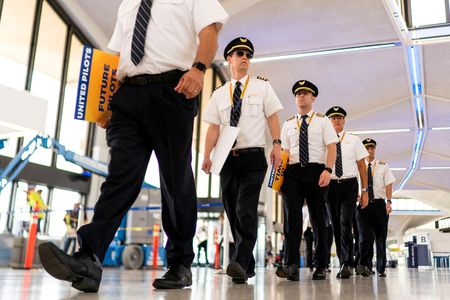By David Shepardson
WASHINGTON (Reuters) – The U.S. House of Representatives is set to vote next week on legislation to raise the mandatory commercial pilot retirement age to 67 from 65 and make other aviation reforms, Republican House leaders said Friday.
The House bill, approved 63-0 by the Transportation Committee in June, would reauthorize Federal Aviation Administration (FAA) aviation safety and infrastructure programs for the next five years. Current authority expires Sept. 30.
The pilot age proposal faces opposition from unions and Transportation Secretary Pete Buttigieg who worry it could complicate operations.
The Air Line Pilots Association (ALPA) says it could cause airline scheduling and pilot training issues and require reopening pilot contracts. Even if approved, current international rules would still prevent pilots older than 65 from flying in most countries outside the United States.
Buttigieg told Fox News Radio Friday that “I would want to see a lot more data before we could feel comfortable with any kind of change” to the pilot age rules.
The Regional Airline Association (RAA) supports the pilot age hike saying it “allows retention of more experienced captains, who can in turn fly alongside and mentor new first officers, helping to stabilize attrition.”
The House bill would also bar airlines from charging family seating fees but would not impose new rules sought by President Joe Biden to compensate passengers for delays. A draft Senate version would boost runway safety, track high-altitude balloons and double U.S. fines for aviation consumer violations.
Neither congressional bill sets minimum airline seat sizes.
The House Rules Committee on Monday is set to consider whether to allow votes on amendments including one to prohibit air carriers from reducing the size of passenger seats until the FAA set minimum passenger seats. Others would mandate passenger compensation for lengthy delays, bar Chinese carriers from flying over Russia and prohibit government purchases of Chinese-made drones.
The Senate bill has been held up by a dispute over whether to change pilot training requirements that were imposed after the February 2009 crash of Colgan Air Flight 3407 near Buffalo that killed 50 people, the last major U.S. passenger airline fatal crash.
Another unresolved issue is whether to expand the number of longer flights allowed from Reagan Washington National Airport. Delta Air Lines supports expanding flights, while United Airlines, American Airlines and others oppose it.
(Reporting by David Shepardson; Editing by Susan Heavey)





